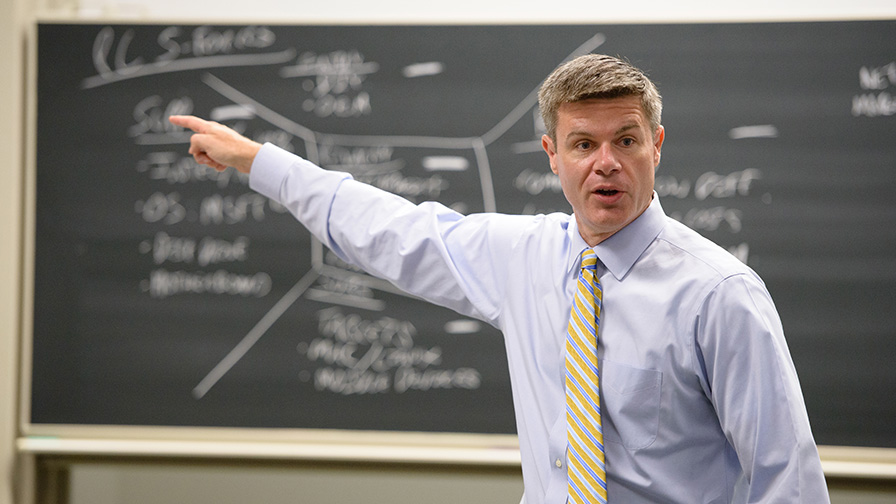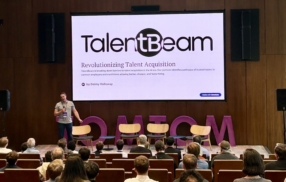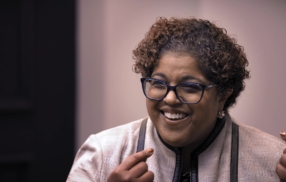
Disruptive Businesses Offer Students Valuable Lessons for Future Careers
By Jay Hodgkins
Mike Lenox, Tayloe Murphy Professor of Business Administration, senior associate dean and chief strategy officer at the University of Virginia Darden School of Business, has built his research and career around studying innovation in business. He has taught students and business executives alike about how innovation is critical to strategy, especially when it comes to established businesses surviving threats from potential disruptive innovators – think Kodak film cameras after the invention of digital cameras.
Here, Lenox answers what today’s UVA students should know about the innovation-obsessed business world that awaits, and what they can do now to prepare for it.
Q. How will the current focus on innovation in the business world impact today’s UVA students when they enter the workforce?
A. When we look at businesses, innovation is critical to their future, critical to their success. Approaches to innovation like design thinking, agile development, lean startup – all of these are ways in which organizations are learning how to quickly reinvent themselves.
This theme of change and innovation is going to be critical to the workforce students are going to be operating in. They need to be exposed to it now as students so they can be effective in that world.
Much has been written about the changing nature of work – that students will face a world in which they will move to new jobs more often, through different industries, through different job functions. The types of skills that are being emphasized as needs in the workplace are evolving and changing. There’s more emphasis on higher cognitive skills and innovation, especially as there are concerns that more and more work is being automated. The value-add has to be from these higher-order capabilities.
Beyond just iterative innovation, it seems there’s been a wave of disruptive innovation in business. Is the world trending to more disruptive innovation?
An interesting observation is that many of the most exciting businesses today weren’t even in existence 10 years ago. This pace of change seems to be accelerating, where we see new businesses coming in and disrupting the old. There is this sense of a faster pace of change. I think what’s interesting with the Ubers and Airbnbs of the world is that they are disrupting these well-established businesses that have existed for decades in fundamental ways. But with today’s accelerated lifecycle, even disruptors are being disrupted within a generation.
What are some of the key lessons about disruptive innovation you focus on in your classes?
We emphasize that we’re facing a world of high uncertainty. There are ways in which you can start to characterize the competitive environment and the likelihood for disruptions to occur. So something we teach is the competitive lifecycle. We see these common patterns in industry evolution over and over in different industries, going back 100 years. We can understand those patterns – when disruptions arise, how they play themselves out.
We also forget that it only takes one idea to be wildly successful to disrupt an industry. There are countless numbers of so-called “guys in the garage,” attempting disruption from every angle. We remember the successes, not the countless failures.
One area I’ve done a lot of research with is the area of shakeouts. With empirical regularity, we see that when new market segments are created or new industries are created, we observe massive entry by a lot of different players, followed by a shakeout where we see a lot of firms going out of business and a lot of consolidation through mergers and acquisitions.
How do you see students preparing for this innovation-driven world through their UVA experience?
This fits into the increasing emphasis on experiential education. I think we’re seeing among students a greater interest in how they can increase their skillset and learning outside the classroom. We’re seeing more and more students, in their free time, building things, inventing things, and this is where the entrepreneurship piece fits in. It’s a much more creative economy now, and students are being asked to come up with their own ventures and ideas.
Learning a process by which to experiment, get feedback and engage with different stakeholders or clients is becoming a really critical skill in the workforce, and students are finding a way to do that now before they get there.
How does this affect their careers after school?
Increasing numbers of students are interested in working for newer, entrepreneurial ventures, both on the for-profit side and the nonprofit side, what might be called social ventures. Students are more interested in creating their own career paths. All of these paths require this same set of skills – higher-order cognitive reasoning, the ability to adapt, to be quick and nimble. These are increasingly valued in the marketplace.
An interesting question is whether the varied desires of millennials is driving the change we see in the nature of work, or is it driven by fundamental changes in technology? I think it’s co-evolving together. People want different work environments than they’ve experienced in the past, so they’re making demands that give them these opportunities. And that feeds back on itself and creates this reinforcing cycle of these types of jobs being created.
My favorite example: I have former students working out in Silicon Valley who contact me and say, “I’ve been working at this firm for 18 months, but I think it’s time to move on because I’ve got to keep learning, I’ve got to keep innovating.”
To an older generation, that’s a shocking perspective – to think 18 months is too long.
This article originally appeared in UVA Today
The University of Virginia Darden School of Business prepares responsible global leaders through unparalleled transformational learning experiences. Darden’s graduate degree programs (MBA, MSBA and Ph.D.) and Executive Education & Lifelong Learning programs offered by the Darden School Foundation set the stage for a lifetime of career advancement and impact. Darden’s top-ranked faculty, renowned for teaching excellence, inspires and shapes modern business leadership worldwide through research, thought leadership and business publishing. Darden has Grounds in Charlottesville, Virginia, and the Washington, D.C., area and a global community that includes 18,000 alumni in 90 countries. Darden was established in 1955 at the University of Virginia, a top public university founded by Thomas Jefferson in 1819 in Charlottesville, Virginia.
Press Contact
Molly Mitchell
Senior Associate Director, Editorial and Media Relations
Darden School of Business
University of Virginia
MitchellM@darden.virginia.edu




